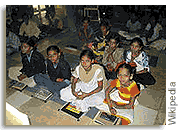(Click text to switch language)
नीचे लिख़े पांच सवालों के जवाब हिंन्दी या फिर अंग्रेज़ी में दें। संज्ञा और उसके लिंग के बारे में जानने के लिये अध्यापक की टिप्पणी को पढ़ें।
Answer the following five questions in either Hindi or English. To learn more about the masculine and feminine nouns, read the Teacher's Note  .
1) Click the View Text button to read the text (if applicable).
2) Read the items/questions and type your response in the space provided. Click the Hint button for additional help.
3) Click the Compare button to see a suggested response and review the feedback.
4) Answer ALL of the items/questions on the screen. Click the next arrow at the bottom of the page to go on to the next set of items/questions (as applicable).
5) After you have responded to and compared all of the items/questions, the Show All button will appear. Click the Show All button to review all of the items together.
The answer will be found in the sentence which begins with the wistful expression काश.
|| She says:
काश आप भी हमारे साथ चल सकते तो कितना अच्छा होता..
If only you could also go there with us, how good it would be...
Focus on the kinship term.
|| She asks about her grandmother's health:
नानीजी आप की सेहत कैसी रहती है?
Grandma, how is your health?
-
The interrogative adjective कैसा agrees with the noun it modifies in number and gender, thus: कैसी.
-
सेहत - health. Similar terms are स्वास्थय from Sanskrit and तबियत from Urdu. For example:
-
आपका स्वास्थय कैसा है? (How is your health?) Since स्वास्थय is masculine, the ending of both the subject and the word question is आ .
-
तुम्हारी तबियत कैसी है? (How is your health?) Since तबियत is feminine, the rest of the sentence shows feminine endings as needed.
Grammar Note: While the question words in English usually come at the beginning of the sentence, in Hindi the word order is flexible. Generally, the question word occurs in the same place in the question as the word that answers the question in the reply.
Focus on the expression अभी भी (still).
Compound word: प्रात (early) + काल (time) = early morning
||
क्या नानाजी अभी भी प्रात:काल सैर को जाते हैं?
Does Grandpa still go for his morning walks?
- प्रात: early + काल time = प्रात:काल early morning (adverb of time)
- The question word क्या is a unique interrogative because, in addition to asking What? questions, by prefacing any statement with क्या, it can turn that statement into a question. The interrogative word is not stressed, and the voice is raised at the end of the sentence.
Look for the adjectives, बहुत, ढ़ेर, सारा, followed by the proper names with the kinship terms.
|| She wrote:
मेरा बहुत ढ़ेर सारा प्यार शीतल मौसी को देना और मनीश भइय्या को मेरी नमस्ते...
Give tons of my love to Sheetal aunty, and greetings to brother Manish.
- She emphasizes her affection for her aunty by using बहुत (a lot), ढ़ेर (bulk, heap, a mass) and सारा (entire) to express the amount of प्यार (love) she sends to her.
Cultural Notes: The customary Indian greetings are नमस्ते or नमस्कार, often said with the hands folded in front of the chest. They are all-purpose greetings, conveying the same message as the English hello, good morning, and goodbye. In letter writing, नमस्ते is usually meant for older people, and प्यार (love) is an informal and intimate message meant for younger or same age people.
The term भइय्या (brother) is to address an older brother; for an older sister the term is दीदी or जीजी .
Click here to review Family Relationships in India
Cultural Note: In India, people like to name their children with meaningful names, because they think that the child will take up the qualities of that name. These are the two names that are mentioned in this text:
- शीतल - cool, calm
- मनीश - intelligent
Look for what comes before the proper name माला.
||
बहुत सारे प्यार सहित, आपकी अपनी, माला
with lots of love, your own, Maala
Note: माला, meaning garland, is a very popular name in India. The word also means a necklace, beads, and a floor in a building . This is how this word would be used:
- मेरा नाम माला है।
My name is Maala.
- यह माला बहुत सुंदर है।
This necklace is so pretty.
- वह चौथे माले पर रहता है।
He lives on the fourth floor.
 हम सभी भाई बहन मिल कर ख़ूब मज़ा करेंगे। काश आप भी हमारे साथ चल सकते तो कितना अच्छा होता। नानीजी आप की सेहत कैसी रहती है क्या नानाजी अभी भी प्रातकाल सैर को जाते हैं मेरा बहुत ढ़ेर सारा प्यार शीतल मौसी को देना और मनीश भइय्या को मेरी नमस्ते। अब मैं अपने पत्र को बंद करती हूं। बहुत सारे प्यार सहित, आपकी अपनी, माला हम सभी भाई बहन मिल कर ख़ूब मज़ा करेंगे। काश आप भी हमारे साथ चल सकते तो कितना अच्छा होता। नानीजी आप की सेहत कैसी रहती है क्या नानाजी अभी भी प्रातकाल सैर को जाते हैं मेरा बहुत ढ़ेर सारा प्यार शीतल मौसी को देना और मनीश भइय्या को मेरी नमस्ते। अब मैं अपने पत्र को बंद करती हूं। बहुत सारे प्यार सहित, आपकी अपनी, माला
|